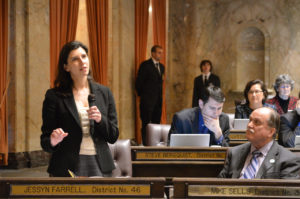The Washington State House passed a $12 minimum wage bill off the floor Tuesday along party lines.
House Bill 1355 passed on a vote of 51 to 46, and one excused, in the Democrat-controlled House, and now faces consideration in the state Senate, where the Republicans hold a majority.

The bill, sponsored by Rep. Jessyn Farrell, D-Seattle, would implement a $10 minimum wage in 2016. It would rise to $10.50 in 2017, $11 in 2018, reaching $12 an hour in 2019, and then be adjusted for inflation afterward.
The current state minimum wage is $9.47 an hour — already the highest state minimum wage in the nation. That’s not counting the city-wide minimum wage increases in Seatac, where the minimum was set at $15 an hour by voter initiative, and Seattle, where the $15 minimum wage will be phased in starting in April.
House Democrats say the people in the lowest paid jobs are often raising families, and raising the minimum wage gives those families the ability improve their standards of living.
“These are moms and dads in our communities who are going to work — putting in a hard day’s work — and yet they’re struggling to pay their bills,” Rep. Pat Sullivan, D-Covington, said.
House Republicans offered several amendments, which were either procedurally dismissed as being being out of scope of the bill, or voted down.
Amendments included a training wage, which would allow employers to hire minors for 85 percent of the minimum wage and an amendment that would have included tips and money paid toward an employee’s medical benefits plan.
Republican representatives expressed concern on the effect on jobs for minors, on small businesses and on communities that are near the Oregon and Idaho state lines.
Rep. Linda Kochmar, R-Federal Way, said she asked some business owners in her district. One told her that he couldn’t shoulder a rise in the minimum wage.
“He said, ‘Not only will I go out of business, but I won’t be able to pay back my loans,’ ” she said. “If we put our businesses out of business, our state is built on the backs of small businesses. I’d prefer a job.”
After the vote, Farrell said that this year’s version of the bill addresses some of the concerns of small business by phasing in the rise over four years instead of three years.
Farrell said that the concept of the minimum wage has some support in the other chamber.
“There is an opportunity to have a really healthy debate,” she said.
“This is a really fantastic milestone,” Farrell said. “I’m excited for it to go to the Senate.”
Sen. Michael Baumgartner, R-Spokane, has said that the House bill will be heard in the Senate Labor committee.
Sen. Linda Evans Parlette, R-Wenatchee, told reporters in a press conference before the House vote that she expected that her caucus’ reception to the bills would be “chilly.”
She recalled some of the testimony by a small business owner who testified before the House.
“A woman who owns a Subway business in Pullman Washington, and just talked about the difficulty of competing with the bordering states,” she said.
Rep. J.T. Wilcox, R-Yelm, told reporters at the same press conference that the $12 minimum wage wasn’t right for all communities.
“It’s possible that the proposals that are being made by the other party make some degree of sense for Seattle, but, again we have two different economies. And it isn’t right to fit the same solutions across the state when you have double and triple the personal income in King County than you do elsewhere,” he said.
But Sen. Pramila Jayapal, D-Seattle, said after the vote that while it could be a challenge to get the bill to a full Senate vote, she hopes for bipartisan cooperation on sick and safe leave and minimum wage.
“I think there are people on both sides of the aisle who want to work on it,” she said.
The House also voted along party lines on HB 1356, approving the “sick and safe leave” bill. The bill would mandate that employees are able to accrue leave for illness, for care of a family member or for dealing with domestic violence.